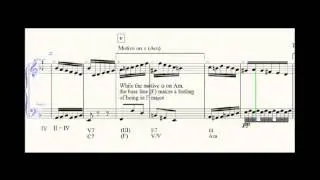Uncategorized
Bach Analysis by Gisela Paterno
Importance of Analysing
In the old times analysing masterpieces was literally the only way of learning musical composition. History is full of stories of how composers would spend long nights transcribing music from other musicians in an attempt to master the craftsmanship of their colleagues or beloved maestros. Bach’s premature blindness is attributed to these kind of practices using poor candle lighting. It is obvious that being exposed to masterpieces on a regular basis pays a paramount role in learning how to compose music.
Generalisations VS Particularities
Reading about general characteristics of musical morphology is important. Nevertheless, in order to properly understand the flow and musicality behind the abstractions, we need to see the theory in action. It is true that most of the music is written and structured using certain popular templates. But what is fundamental is to find the place where our creativity can exist within those stiff predictive structures. Understanding how to balance phrases, episodes and sections between each other can prove to be quite daunting. In spite of the fact that there is lot of literature written on the matter, the only way of naturally incorporating its conceptualisations to our compositional habits is by surveying as many examples of each template as possible. Only by getting to see many examples is that we will get inspired to play with different elements and put them at the service of our very personal creativity.
Bach in particular
One of the greatest advantages of starting by writing in counterpoint style is that we only work with one single primordial material: the motive. Basically all the piece will revolve around a clear centre.
In the following video, Gisela Paterno – Composition Professor at WKMT, exemplifies clearly this musical phenomenon…
Bach Piano:
https://www.youtube.com/watch?v=KATO9nq4BXI
In the following article by Gisela Paterno, you will find very useful examples of melodies from Bach and how the composer uses different melodic techniques:
https://www.piano-composer-teacher-london.co.uk/post/how-to-write-a-melody
#compositionlondon

